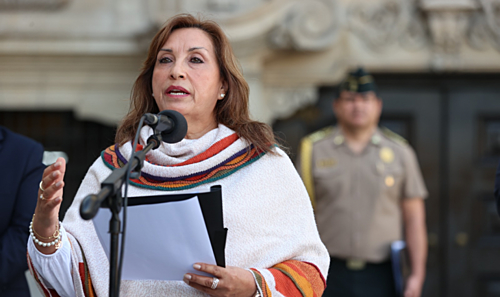
In a speech on national television made this Friday (16/06), the president of Peru, Dina Boluarte, announced a decree that ends the discussion of the last bill that proposed the anticipation of the presidential elections in the country.
In the video, Boluarte appeared together with the head of the Council of Ministers, Alberto Otárola, and with the Minister of Economy, Alex Contreras. “This issue of early elections is closed, we will continue to work responsibly, in respect for the rule of law, democracy and the Constitution, until July 2026”, stressed the president.
The anticipation of elections was the main demand of social movements since the beginning of the most recent political crisis in Peru, originated by the removal of former president Pedro Castillo in December 2022 and his replacement by Boluarte, whose government was considered illegitimate by several sectors.
The situation generated an intense wave of protests demanding new elections in the country in 2023, in addition to holding a plebiscite to create a constituent assembly and write a new constitution, replacing the current one, imposed in 1992 by then dictator Alberto Fujimori.
Between December 2022 and January 2023, three projects proposing the anticipation of elections were presented to the country’s Congress (unicameral), but two of them, which provided for voting in 2023, were rejected by congressmen, and a last initiative, which provided for a new election only in 2024, had been frozen in the Legislature since last March.
Boluarte’s decision comes on the eve of a new wave of demonstrations that Peruvian social movements have been announcing for the months of June and July. The so-called “New Taking of Lima”, evoking the “Taking of Lima” that took place in February of this year, foresees a march of movements starting from different regions of Peru towards the country’s capital, to demand the anticipation of the elections.
So far, the movements have not commented on whether Boluarte’s decision will change the agenda of demonstrations scheduled for the coming weeks.
Human rights violations
Popular indignation against the Boluarte government, arising from what was considered by social movements as an “illegitimate transition” after the fall of Castillo due to an impeachment process, was reinforced by the very strong state repression against protests in the country.
Between December and March, several social movements held almost daily events in different cities. All these events were the target of violent actions by the Peruvian National Police (PNP) and also by the Armed Forces – the latter were called into action in January, when the president declared a state of emergency due to the demonstrations.
This state violence has generated a large number of victims. In March of this year, a group of Observers from the Inter-American Commission on Human Rights visited Peru, in a joint effort with the National Human Rights Coordinator of that country.
The Commission’s final report, published in April, pointed out that there were 73 officially registered deaths during the first four months of protests in the country. In addition, the document states that at least 48 of these deaths show evidence of “extrajudicial executions”, which would have been committed by police or military.
Thousands of other cases of human rights violations were also reported, including people injured by state agents, abusive arrests and sexual violence.
Encounter with Lasso
A curiosity of this Friday’s pronouncement is that it takes place the day after the bilateral meeting between Boluarte and the president of Ecuador, Guillermo Lasso.
The irony of the meeting between Lasso and Boluarte, which took place this Thursday (15/06) in the Peruvian city of Piura, is that the Ecuadorian leader carried out in his country exactly what the Peruvian movements ask of Boluarte: he decreed the anticipation of the presidential elections .
However, it is necessary to understand the context: in the Ecuadorian case, the right-wing president was facing an impeachment process that had a high chance of being approved, due to the opposition majority in Congress, which is why he activated a constitutional instrument called “crossed death”, which dissolves the Legislature and obliges the Head of State to call general elections immediately.
With that, Lasso avoided his own impeachment. At the same time, the electoral authorities in Ecuador began to hastily organize early general elections, whose first round was scheduled for August 20 – a possible second round would be on October 15.
In Peru, one of President Boluarte’s justifications – elected vice on the progressive ticket with Pedro Castillo, but who allied himself to the right after taking power – for not supporting projects to anticipate elections was that “it takes time to organize general elections”, which is why, according to her, it would be impossible for them to take place in 2023.
However, the same Boluarte was one of the first to support its Ecuadorian counterpart, even praising its decision to bring forward the elections in its country. “We respect a decision that was adopted within the constitutional framework and we hope that the next electoral process in our neighboring country will take place within the legal parameters, in peace and with democracy”, expressed the representative.
With information from La República, Infobae and TeleSur.
Source: www.brasildefato.com.br

